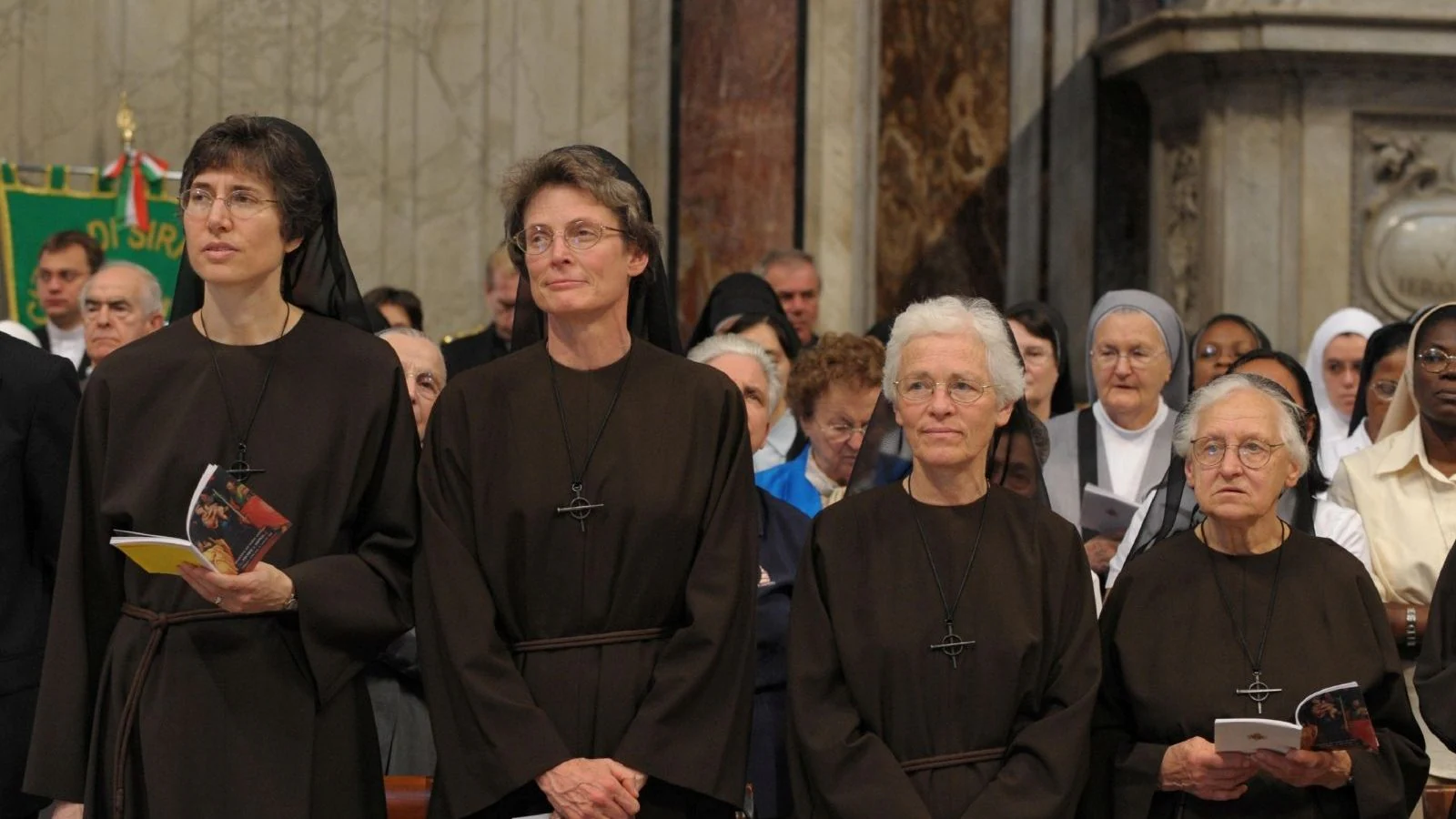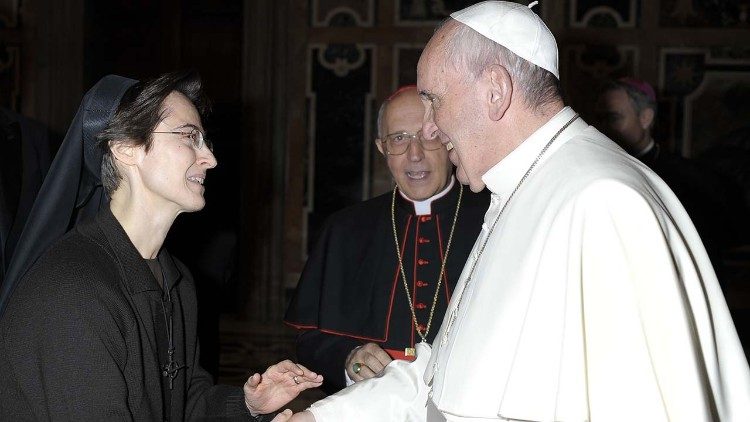Pope Francis appointed yesterday the first woman to lead the Vatican government, the Franciscan, insisting on his desire to achieve greater gender equality in the Church.
 As the newly appointed general secretary of the Vatican government, the 52-year-old Italian nun Rafaela Petrini will be responsible for overseeing administrative operations, mainly in the Vatican museums, the post office and the police; thus becoming the highest ranking woman in the smallest state in the world.
As the newly appointed general secretary of the Vatican government, the 52-year-old Italian nun Rafaela Petrini will be responsible for overseeing administrative operations, mainly in the Vatican museums, the post office and the police; thus becoming the highest ranking woman in the smallest state in the world.
The appointment of Petrini, who holds a degree from LUISS, a prestigious Italian University of Economics, reflects the Pope's promise from few years ago to improve the gender balance.
According to the online newspaper National Catholic Reporter, this position is traditionally occupied by a bishop.
Francis, 84, has repeatedly said he wants women to play a more important role in the Catholic Church.
RESOURCE | ABOUT THE POLITICS OF VATICAN CITY
The politics of Vatican City take place in a framework of a theocratic absolute elective monarchy, in which the Pope, religiously speaking, the leader of the Catholic Church and Bishop of Rome, exercises ex officio supreme legislative, executive, and judicial power over the Vatican City (an entity distinct from the Holy See), a rare case of non-hereditary monarchy.
The pope is elected in the Conclave, composed of all the cardinal electors (now limited to all the cardinals below the age of 80), after the death or resignation of the previous Pope. The Conclave is held in the Sistine Chapel, where all the electors are locked in (Latin: cum clave) until the election for which a two-thirds majority is required. The faithful can follow the results of the polls (usually two in the morning and two in the evening, until election) by a chimney-top, visible from St. Peter's Square: in a stove attached to the chimney are burnt the voting papers, and additives make the resulting smoke black (fumata nera) in case of no election, white (fumata bianca) when the new pope is finally elected.
The Dean of the Sacred College (Cardinale Decano) will then ask the freshly elected pope to choose his pastoral name, and as soon as the pope is dressed with the white cassock, the Senior Cardinal-Deacon (Cardinale Protodiacono) appears on the major balcony of St. Peter's façade to introduce the new pope with the famous Latin sentence Annuntio vobis gaudium magnum: habemus papam (I announce to you a great joy: We have a Pope). The term "Holy See" refers to the composite of the authority, jurisdiction, and sovereignty vested in the Pope and his advisers to direct the worldwide Catholic Church. It is therefore quite distinct from the Vatican City state, which was created in 1929, through the Lateran treaties between the Holy See and Italy. As the "central government" of the Catholic Church, the Holy See has a legal personality that allows it to enter into treaties as the juridical equal of a state and to send and receive diplomatic representatives. It has formal diplomatic relations with 179 nations.
The State of Vatican City, for its part, is recognized under international law as a sovereign territory. Unlike the Holy See, it does not receive or send diplomatic representatives, and the Holy See acts on its behalf in international affairs.
ADMINISTRATION
As with almost all monarchies, the executive, legislative and judicial power of government reside in the crown, in this case in the office of the Bishop of Rome (the pope). However, as with many monarchies, the pope exercises this power through other organs which act on his behalf and in his name but rarely spoke with others.
The pope commonly delegates the internal administration of Vatican City to various bodies and officials. However, according to the Fundamental Law of Vatican City State, "The Supreme Pontiff, sovereign of Vatican City State, has the fullness of legislative, executive, and judicial powers" for Vatican City.
The pope delegates legislative authority for the state to the unicameral Pontifical Commission for Vatican City State. This commission was established in 1939 by Pope Pius XII. It consists of seven Cardinals appointed by the pope for five-year terms. Laws passed by the Commission must be approved by the pope through the Secretariat of State prior to being published and taking effect.
The President of the Pontifical Commission is also the President of the Governorate of Vatican City, to whom the pope delegates executive authority for the state. The president is assisted by a Secretary General and a Vice Secretary General. Each of these officers is appointed by the pope for a five-year term. Actions of the President must be approved by the Commission. Various departments and offices report to the Governorate, handling such issues as communications, internal security, fire protection, and the Vatican Museums. The Corpo della Gendarmeria is the state's security and police force, not the Pontifical Swiss Guard, which is an organ of the Holy See, not Vatican City.
EXECUTIVE
The Pope is ex officio sovereign of the Vatican City State since 1929. He delegates executive authority to the President of the Pontifical Commission for Vatican City State, who is ex officio President of the Governorate and head of government of Vatican. The president is appointed by the Pope for a five-year term, but may be removed at any time by the pope. The president reports all important matters to the Secretariat of State, the Pope's chief everyday advisory body, which is consulted on all matters, even if they belong to the specific competence of the Commission for Vatican City State or, for instance, that of the Congregation for Catholic Education. The Secretariat of State is not thereby considered to hold responsibility for such matters, and the Cardinal Secretary of State is not seen as heading the Vatican City State or the various departments of the Roman Curia, other than the Secretariat of State itself.
Vatican City is a member of CEPT, Eutelsat, International Grains Council, Intelsat, ITU and UPU. Vatican City does not have direct diplomatic relations with other states. Its foreign relations are managed by the Holy See.
LEGISLATIVE
A unicameral Pontifical Commission for Vatican City State, appointed by the Pope, operates as legislative branch, proposing law and policy to the Pope. Prior to taking effect, laws and policies passed by the commission must be approved by the Supreme Pontiff, through the Secretariat of State, and be published in the Italian-language supplement of the Acta Apostolicae Sedis that deals with Vatican City State matters.
The "Councillors of the State" give their consultation in the drafting of legislation. They may be consulted either alone or collegially.
(Source: Wiki )


